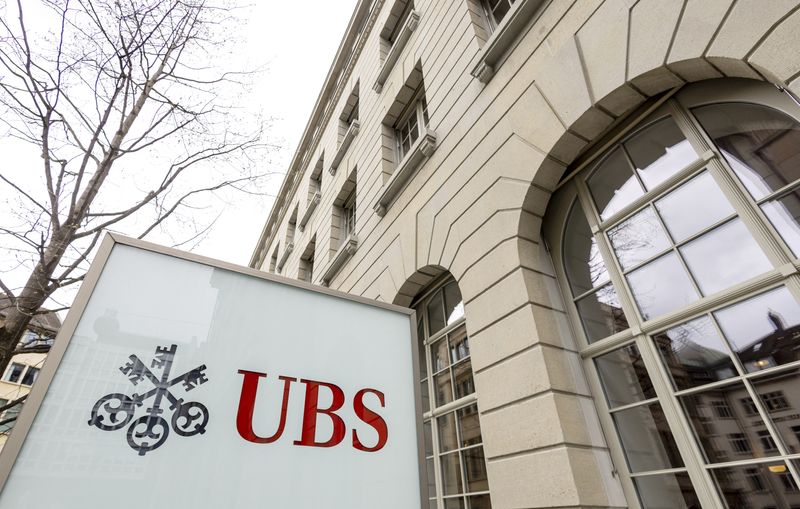By Tomasz Janowski, Oliver Hirt and Selena Li
ZURICH (Reuters) -UBS has flagged tens of billions of dollars of potential costs - and benefits - from its takeover of Credit Suisse, underscoring the high stakes involved as it prepares to complete the rescue of its struggling Swiss rival.
In a regulatory presentation, UBS estimated a negative impact of $13 billion from fair value adjustments of the combined group's financial assets and liabilities, and a further $4 billion in potential litigation and regulatory costs stemming from outflows.
It also listed other factors, including a switch in accounting standards, that would bring the total hit to $28.3 billion.
However, that would be offset by $17.1 billion from a write-down of Credit Suisse's AT1 bonds and other factors.
Furthermore, UBS estimated it would book a one-off gain stemming from the so-called negative goodwill of $34.8 billion by buying Credit Suisse for a fraction of its book value.
The financial cushion will help absorb potential losses and could result in a boost to the lender's second-quarter profit if UBS closes the transaction next month as planned.
While the financial implications of the deal were widely anticipated - UBS shares were broadly steady on Wednesday - the scale of the adjustments are yet another sign of Credit Suisse's frailty and the challenges UBS faces in integrating the lender.
In providing the first snapshot of what the combined group will look like, UBS said the estimates were preliminary and the numbers could change materially. It also said it might book restructuring provisions after that, but offered no numbers.
Charges to restructure the bank are likely to be booked after the transaction closes, Vontobel analyst Andreas Venditti said in a note. Savings will come principally from cutting staff, UBS has said in recent weeks.
Meanwhile, UBS has implemented a number of restrictions on Credit Suisse while the takeover is underway, including limits on how much it can lend, how much it can spend and the size of certain contracts it can enter into.
"Credit Suisse obviously found itself in a problem because of lapses in its risk controls and I think just setting these parameters on the ability or standards to lend out is not very unreasonable," said Benjamin Quinlan, Hong Kong-based chief executive of financial consultancy firm Quinlan & Associates.
"Ultimately, from UBS' perspective, they will have to wear these risks on their books."
The restrictions "will cause certain clients to leave Credit Suisse" but may not accelerate the pace of outflows already seen, said Quinlan, following UBS's statement last week that Credit Suisse had already stemmed asset outflows.
RUSHED INTO RESCUE
UBS said it was rushed into the deal and had less than four days to complete due diligence given the emergency circumstances as Credit Suisse's financial health rapidly worsened after it had already endured a difficult year.
Under the rescue deal engineered by Swiss authorities over one March weekend amid global banking turmoil, UBS agreed to buy Credit Suisse for 3 billion Swiss francs ($3.4 billion) in stock and to assume up to 5 billion francs in losses that would stem from winding down part of the business.
The first rescue of a global bank since the 2008 financial crisis, which is backed by up to 250 billion Swiss francs in public funds, will create a wealth manager with more than $5 trillion in invested assets and over 120,000 employees globally.
UBS signaled the difficulties at the 167-year-old Credit Suisse will persist, and expects its one-time rival to report substantial pretax losses in the second quarter and the whole of this year.
Following the legal closing of the transaction, UBS Group AG (SIX:UBSG) plans to manage two separate parent companies – UBS AG and Credit Suisse AG, UBS said last week. It has said the integration process could take three to four years.
During that time, each institution will continue to have its own subsidiaries and branches, serve its clients and deal with counterparties.
UBS shares are little changed since the deal was announced.
